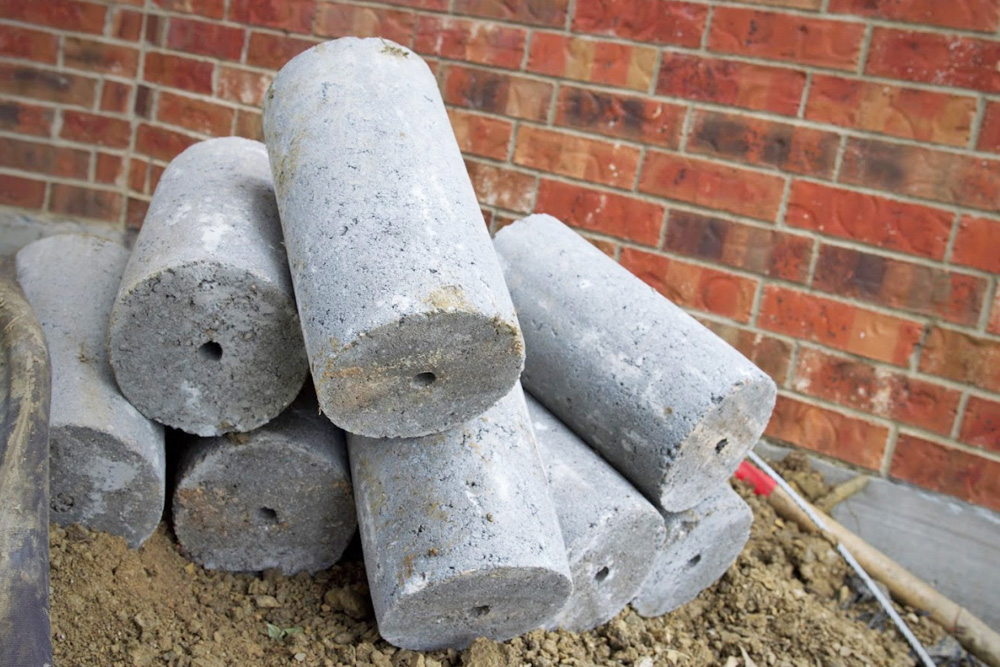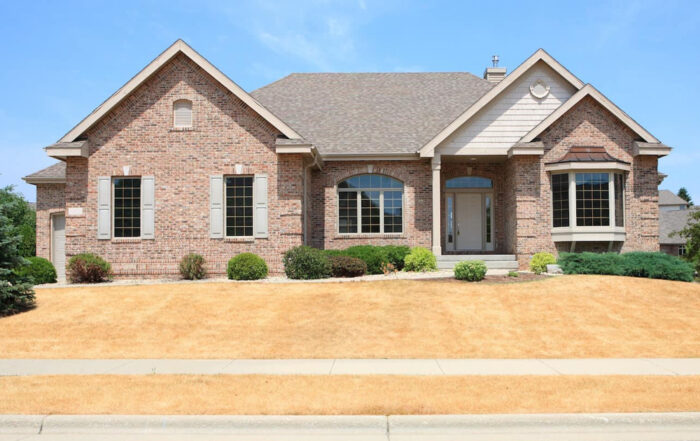Composite Piers For Home Foundations

When it comes to building structures, a strong foundation is essential to ensure stability and longevity. Over the years, various foundation methods have been developed to accommodate different:
- Soil conditions
- Structural requirements
- Budget constraints
One such innovative approach is the use of a composite pier foundation. In this blog post, we’ll delve into what composite pier foundations are, discuss their advantages and disadvantages, explore the associated costs, and examine some alternative foundation methods.
Wondering if foundation piers are right for you? Keep reading to find out!
What Are Composite Pier Foundations?
Composite pier foundations, also known as helical pile foundations, are a type of deep foundation system designed to support and stabilize structures in challenging soil conditions. Unlike traditional shallow foundations that rely on spread footings or slabs, composite pier foundations penetrate the ground to reach stable soil layers or bedrock. These foundations consist of steel shafts with helical plates (or “piles”) that are screwed into the ground using hydraulic machinery.
The concept behind composite pier foundations is simple yet ingenious. The helical plates create a spiral shape that effectively “screws” the pile into the soil, providing exceptional load-bearing capacity and stability. These foundations are particularly useful in areas with poor soil quality, high water tables, or earthquake-prone regions.
The Pros and Cons of Composite Pier Foundations
As with any construction technique, composite pier foundations come with their own set of advantages and disadvantages.
✅ Pros:
- Versatility: Composite pier foundations can be used for various types of structures, from residential homes to commercial buildings, bridges, and even utility poles.
- Rapid Installation: The installation process is relatively quick and efficient, requiring less time compared to traditional foundation methods. This can lead to reduced construction timelines.
- Minimal Site Disruption: The installation process generates less noise, vibration, and soil disturbance compared to other foundation methods, making them suitable for urban or environmentally sensitive areas.
- Predictable Performance: The load-bearing capacity of composite pier foundations can be accurately determined during installation, ensuring that the foundation can safely support the intended load.
- Cost-Effectiveness: While initial costs may be higher than some shallow foundation methods, composite pier foundations can result in cost savings over time due to their durability and reduced maintenance needs.
❌ Cons:
- Initial Cost: The upfront cost of installing composite pier foundations can be higher compared to traditional shallow foundations. However, the long-term benefits may offset this initial investment.
- Specialized Equipment: The installation of composite pier foundations requires specialized equipment and skilled operators, which can impact the availability and cost of the installation process.
- Soil Conditions: While these foundations are suitable for a wide range of soil conditions, they may not be ideal for every scenario. Extensive soil testing and analysis are crucial to determine the appropriateness of this method for a specific project.
Cost Considerations for Composite Pier Foundations
The cost of composite pier foundations can vary depending on several factors, including the size of the structure, the soil conditions, the depth of installation, and the geographical location. Generally, composite pier foundations tend to have higher upfront costs compared to traditional shallow foundations. However, these costs can be justified by the long-term benefits and reduced maintenance expenses.
4 Alternative Foundation Methods
While composite pier foundations offer several advantages, it’s essential to explore alternative foundation methods to make an informed decision based on project-specific requirements. Some common alternatives include:
1) Spread Footings
Spread footings, also known as isolated footings, are a conventional shallow foundation option. They distribute the load of the structure over a larger area of soil. These foundations are suitable for smaller structures and relatively stable soil conditions.
2) Slab-on-Grade
Slab-on-grade foundations consist of a concrete slab poured directly on the ground. They are often used for residential homes and can be cost-effective, especially in regions with favorable soil conditions.
3) Pile Foundations
Pile foundations involve driving or drilling long piles into the ground to reach stable soil layers or bedrock. This method is suitable for areas with poor soil conditions or high water tables. Pile foundations can be made of various materials, including concrete, steel, or timber.
4) Basement Foundations
Basement foundations provide additional living or storage space below ground level. They are commonly used in regions with cold climates and can offer insulation benefits.
How to Find Foundation Repair Contractors
Choosing the right contractor is a crucial step in ensuring the success of your composite pier foundation project. A reputable contractor with experience in helical pile installations can make all the difference in the quality and longevity of your foundation. Here are some steps to help you find a reliable and experienced composite pier foundation contractor:
- Research and Recommendations: Start by asking for recommendations from friends, family, or colleagues who have had similar foundation work done. You can also consult local builders’ associations, real estate agents, or architects for referrals to trusted contractors in your area.
- Check Qualifications and Licensing: Verify that the contractor holds the necessary licenses and certifications to perform foundation work in your region. This ensures that they comply with local regulations and have the required expertise.
- Experience and Portfolio: Look for contractors with a proven track record of successful composite pier foundation installations. Ask for examples of past projects or a portfolio showcasing their work. An experienced contractor is more likely to handle unexpected challenges effectively.
- Online Reviews and Ratings: Search for the contractor’s online presence, including reviews and ratings on platforms such as Google, Yelp, or Angie’s List. Reading about other clients’ experiences can give you insights into the contractor’s professionalism and quality of work.
- Insurance and Warranties: Ensure that the contractor carries liability insurance and provides warranties for their work. This protects you from potential issues that may arise during or after the installation.
- Ask for References: Request a list of references from the contractor and take the time to contact previous clients. Inquire about their satisfaction with the work, communication, and any issues that were resolved.
- Get Multiple Quotes: Reach out to multiple contractors and request detailed quotes for your project. This will give you a better understanding of the cost breakdown and allow you to compare different options.
- Communication and Transparency: A reputable contractor should be open to answering your questions, explaining the installation process, and addressing any concerns you may have. Clear communication is key to a successful working relationship.
- Visit Ongoing Projects: If possible, visit an ongoing or completed project the contractor has worked on. This can provide you with a visual representation of their workmanship and attention to detail.
- Local Knowledge: Opt for a contractor who is familiar with the local soil conditions, building codes, and environmental factors. Local knowledge can contribute to a smoother installation process.
- Contract and Scope of Work: Once you’ve selected a contractor, ensure that all project details, including scope of work, timelines, payment terms, and warranties, are documented in a written contract. Review the contract carefully before signing.
- Trust Your Instincts: Beyond qualifications and credentials, trust your instincts when evaluating a contractor. A positive rapport and a sense of professionalism can go a long way in establishing a productive working relationship.
Work With the Best
Your home deserves the best possible care, and that is exactly what you will get when you work with Perma Pier Foundation Repair of Texas. We are the area’s leading expert on foundation piers and can help you choose a material that works best for your home. Contact us today to set up your free foundation inspection.



